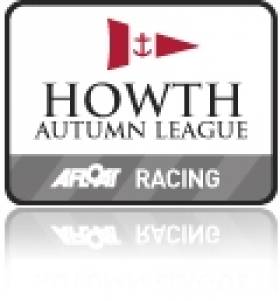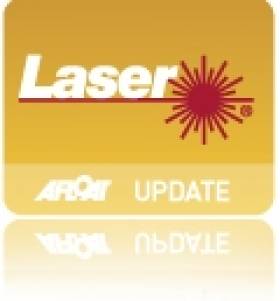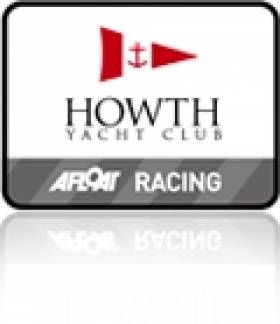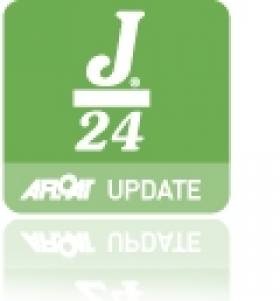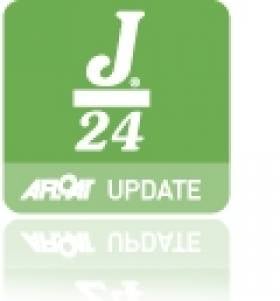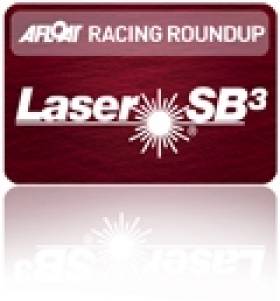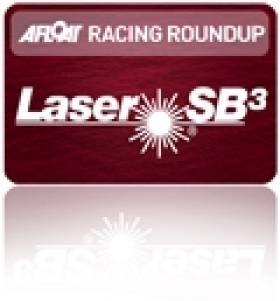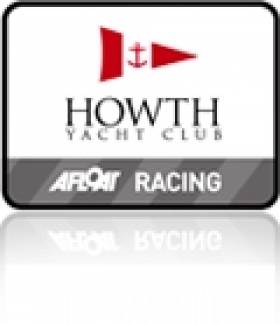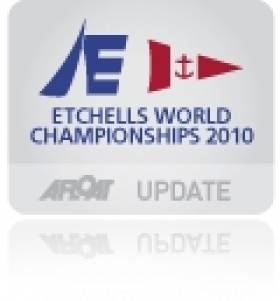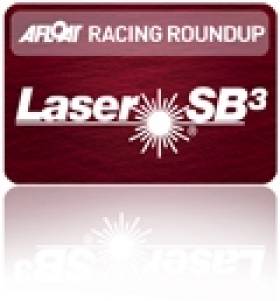Displaying items by tag: Howth YC
Kellegher Leads Howth Yacht Club's Laser Standard Fleet
Cull Wins Howth Laser Opener
HOWTH YACHT CLUB. LASER FROSTBITE WINTER (O'ALL) 31/10/2010 LASER STANDARD: 1, Joe Cull HYC (2.00); 2, David Quinn HYC (6.00); 3, Evan Dolan NYC (6.00); LASER STANDARD APPRENTICE: 1, Brendan Costello MYC (2.00); 2, Conor Hopkins HYC (4.00); LASER STANDARD MASTER: 1, David Quinn HYC (4.00); 2, Evan Dolan NYC (4.00); 3, Conor Greagsber NYC (7.00); LASER STANDARD GRAND MASTER: 1, Joe Cull HYC (2.00); 2, Michael Evans HYC (6.00); 3, Robin Hegarty HYC (6.00); LASER RADIAL: 1, Darragh Peelo MYC (2.00); 2, Simon Revill HYC (4.00); 3, Ciaran Costello MYC (6.00)
Storm Threat in HYC League
HOWTH YACHT CLUB AUTUMN LEAGUE (RACE 2) 26/09/2010 Class 1 IRC: 1, Storm P Kelly HYC; 2, Crazy Horse Chambers/Reilly HYC; 3, Equinox R McDonald HYC; Class 1 ECHO: 1, Storm P Kelly HYC; 2, Equinox R McDonald HYC; 3, Makutu Newman/Others HYC; Class 2 IRC: 1, Kinetic Colwell/Murphy HYC; 2, King One D Cullen HYC; 3, MiniMumm Cobbe/McDonald HYC; Class 2 ECHO: 1, Kinetic Colwell/Murphy HYC; 2, MiniMumm Cobbe/McDonald HYC; 3, King One D Cullen HYC; Class 3 IRC: 1, Alliance V Gaffney HYC; 2, Gecko K Darmody HYC; 3, Holly B MacMahon HYC; Class 3 ECHO: 1, Gecko K Darmody HYC; 2, Rossinver C Scott HYC; 3, Starlet E Bourke HYC; Class 4 ECHO: 1, On the Rox C & J Boyle HYC; 2, Flashback Hogg/Others HYC; 3, Bite the Bullet C Bermingham HYC; Class 4 IRC: 1, Flashback Hogg/Others HYC; 2, Bite the Bullet C Bermingham HYC; 3, Trinculo M Fleming HYC; Class 5 ECHO: 1, Demelza Ennis/Laudan HYC; 2, Voyager J Carton HYC; 3, Force Five R & J McAllister HYC; Class 5 IRC: 1, Voyager J Carton HYC; 2, Alphida H Byrne HYC; 3, Force Five R & J McAllister HYC; Puppeteer SCRATCH: 1, Harlequin Clarke/Egan HYC; 2, Yellow Peril N Murphy HYC; 3, Gold Dust Walls/Browne HYC; Puppeteer HPH: 1, Yellow Peril N Murphy HYC; 2, Ghosty Ned D Harkin HYC; 3, Harlequin Clarke/Egan HYC; Squib SCRATCH: 1, Kerfuffle Craig/Raune HYC; 2, Klipbok E Dalton HYC; 3, Shadowfax P Merry HYC; Squib HPH: 1, Kerfuffle Craig/Raune HYC; 2, Klipbok E Dalton HYC; 3, Shadowfax P Merry HYC; 17 Footer SCRATCH: 1, Aura I Malcolm HYC; 2, Rita Lynch/Curley HYC; 3, Deilginis Delginis Group HYC; 17 Footer HPH: 1, Aura I Malcolm HYC; 2, Deilginis Delginis Group HYC; 3, Rita Lynch/Curley HYC; Etchells SCRATCH: 1, Fuzzy Duck B O'Neill HYC; 2, Kootamundra O'Grady/Reilly HYC; 3, Northside Dragon J Bourke RStGYC; J 24 SCRATCH: 1, Jibberish O'Kelly/Others HYC; 2, Scandal B McDowell MYC; 3, Hard on Port F O'Driscoll RStGYC
Masterclass by O'Driscoll earns J/24 national title
An exhibition of how to win sailing races on the second day of the Irish J/24 Championships at Howth saw Flor O'Driscoll and his crew from the Royal St.George YC on 'Hard on Port' deservedly win the national title he has craved for several years, by the impressive margin of 19 points.
Three bullets on day two, including one which required coming from behind to outfox former champion Stefan Hyde by the final leeward mark, was sufficient to give the pre-event favourite the championship. O'Driscoll's cause was certainly helped when overnight leader and defending champion Mickey McCaldin on 'Murder Picture' (LEYC) was one of five boats 'black-flagged' on the first race start after PRO David Lovegrove imposed the penalty following a couple of general recalls.
That effectively ended the Ulster crew's challenge and it was followed by two other poor results which ultimately dropped them to 6th overall. The black flag decision also had a significant impact on other overall results, with another Lough Erne entry, Diarmuid O'Donovan's 'Sayonara' jumping four places to earn the runners-up spot, thanks to two second places and an 8th. It was enough to edge past clubmate and J/24 Class President Robin Eagleson who wasn't as effective as on the first day but did more enough to justify 3rd overall and also first in the silver fleet for the older boats.
Howth's 'Jibberish' (Fergus O'Kelly et al) was more than pleased with 4th overall, just one point away from a podium finish, an encouraging performance considering the crew did not have the benefit of a full season's practice as a result of serious collision damage back in June. One point further back was Andrew Mannion's 'Jeb Stuart', with three top six places on the second day lifting the Lough Ree boat two places in the overall standings.
That four points separated second from fifth places overall indicates the closeness of one-design racing while Gordon Davies on the Jury Boat was kept busy over the two days maintaining rule observation on the water. The full 8-race schedule was completed, generally in fresh westerlies, with the race management team complemented on their performance over both days, when strong tides were a significant factor.
The 17-boat fleet, one of the biggest J/24 fleets in recent years, augurs well for the J/24 Europeans at Howth next year, with around eight nations already confirming their intention to compete.
J/24 National Championship – final results after 8 races:
1. Hard on Port – Flor O'Driscoll (RStGYC) 13 points
2. Sayonara – Diarmuid O'Donovan (LEYC) 32 points
3. Luder Too – Robin Eagleson (LEYC) 34 points
4. Jibberish – Fergus O'Kelly (HYC) 35 points
5. Jeb Stuart – Andrew Mannion 36 points
6. Murder Picture – Mickey McCaldin (LEYC) 44 points
McCaldin Defending Title in Style
His championship defence couldn't have started any better, with three successive bullets. The fourth race was something of a disaster for them finishing 14th but 5th in the final race of the first day sees them two points clear of their major rival for the honours, Flor O'Driscoll (RSt.GYC) on 'Hard on Port' who notched up three third places and a win the final race to stay very much in touch with the defending champion.
Local hopes centre on 'Jibberish' (O'Kelly & Co) and they did not disappoint. Having only taken delivery of the boat two days ago after repairs to serious damage suffered months ago in a T-bone collision, they might be excused for not performing, as they got re-0acquainted with their boat. A results card that included two second places and the most impressive race win of the day – the margin of victory was very impressive – puts the Howth crew in third place overall going into the second day.
Tying on points but ranked as 4th is J/24 Class President Robin Eagleson of Lough Erne YC on 'Luder Too' who also showed great consistency with three second places and might have ended the day even higher up the leader-board if it wasn't for a disastrous last race when the tides played havoc with the distinctively red boat at the windward mark.
Two other northern boats – JP McCaldin's 'Jamais Encore' (Dalgety Bay SC) and 'Sayonara' (D.O'Donovan, LEYC) – fill the next two places overall.
The five windward-leeward races were sailed in varying (although generally fresh) conditions, with headsail changes the order of the day, while the last race threw up gusts of 30 knots plus at the 17-boat fleet. The series concludes on Sunday 12th with three races scheduled by PRO David Lovegrove and his team on 'Free Enterprise'.
J/24 National Championship – overall places after 5 races:
Mickey McCaldin – LEYC – 8 points
Flor O'Driscoll – RStGYC – 10 points
Fergus O'Kelly & Co. – HYC – 14 points
Robin Eagleson – LEYC – 14 points
J.P. McCaldin (DBSC) – 20 points
D.O'Donovan – LEYC – 20 points
Photo Gallery by Gareth Craig HERE
Day Two: Flannigan Takes the SB3 Lead
Leaders from day one Ben Duncan, Brian Moran and Ric Morris had a more testing day with some interesting action at the start of race 4 and 5 leaving them playing catch up. Scoring 6,11,7 they slip back to second tied with Sean Craig (5,3,10). Winner of todays final race Andrew Algio, Garry Houghton and Richard Knatchbull added a 13th and a 6th to a win in the final race to move up to 4th. Ross Vaughan, Rory Fitzpatrick and Ryan Seartons 11, 1, 33 was enough to move them up to 5th.
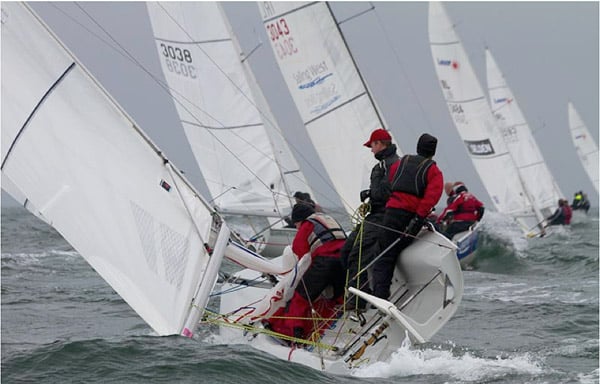
Squally conditions on Day two of the SB3 Nationals. Photo: Gareth Craig. More photos HERE.
HOWTH YACHT CLUB. SB3 NATIONALS (O'ALL) 04/09/2010 SB3: 1, McCreadys Gill Team Gareth Flannigan RUYC (13.00); 2, Sharkbait Ben Duncan HYC (21.00); 3, Yeti Sean Craig RStGYC (21.00); 4, Flutter Andrew Algeo RStGYC (34.00); 5, Toucan 3 Ross Vaughan RNIYC (38.00)
Day Two photos by Gareth Craig HERE.
Going Right Pays Dividends for Boomsticks (SB3 vid HERE)
Crazy Horse Romps Home in Howth
HOWTH YACHT CLUB. SEPT MINI WED (RACE) 01/09/2010 Class 1 IRC: 1, Crazy Horse Reilly/Chambers; 2, Makutu Doyle/Others; 3, Storm P Kelly; Class 1 HPH: 1, Makutu Doyle/Others; 2, Crazy Horse Reilly/Chambers; 3, Storm P Kelly; Class 2 IRC: 1, Impetuous Noonan/Chambers; 2, Sunburn I Byrne; 3, Superhero Burne/Banahan; Class 2 HPH: 1, Impetuous Noonan/Chambers; 2, MiniMumm Cobbe/McDonald; 3, Jokers Wild G Knaggs; Class 3 IRC: 1, Gecko K Darmody; 2, Starlet Bourke/Others; 3, Holly B MacMahon; Class 3 HPH: 1, Gecko K Darmody; 2, Rossinver C Scott; 3, Midnight Sun Bolger/Others; White Sails HPH: 1, Cu na Mara C Brown; 2, Force Five R & J McAllister; 3, Cogar K & C Halpin; White Sails IRC: 1, Alphida H Byrne; 2, Force Five R & J McAllister; 3, Savarna Burke/Curtis
Etchells World's Photos Now Online!
Photographer Ingrid Abery who covered last week's Etchell's World Championships in Howth has uploaded images to the Afloat gallery HERE.
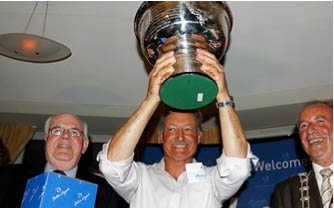
John Bertrand picks up the World Trophy in Howth. Photo: Ingrid Abery
Fifty Boats Expected for SB3 Nationals
A fleet of up to 50 boats from 10 clubs is a strong possibility for the Investwise SB3 Irish National Championships at Howth YC on September 3rd-5th, with 'McCready Sailboats' (Gareth Flannigan, Ballyhome) and 'Sharkbait' (Ben Duncan of the host club) among the pre-racing favourites.
The two crews have been regular front-runners in the Irish fleet, with wins at the Southerns and Northerns respectively, and they sit on top of the ranking ladder this year. Peter Kennedy (RNIYC), who won the title last year in Cork, and former All-Ireland Champion Sean Craig are also expected to be among the leading contenders.
The Western Championships in Galway a fortnight before the Nationals will give a further indication of form although such is the high level of competition in the SB3 class that any one of 10 crews has the potential to lift the title.
The Nationals, under the control of PRO David Lovegrove (???), will involve 8 races over three days, with the fleet being split into gold, silver and bronze divisions after the second day, based on overall positions at that time.
The sponsor is Investwise, a financial planning firm based in Dublin's docklands whose managing director David Quinn is an active SB3 sailor in Howth. Established in 1988, the firm offers independent, impartial, client-focused advice on all aspects of personal finance including pension strategies, savings and investments and guidance on lending and debt issues.
"As a keen SB3 sailor, I am delighted to have the opportunity to be associated with the Nationals as its title sponsor and I wish all the competitors – and the organizers – the best of luck for the event", said David Quinn.


























